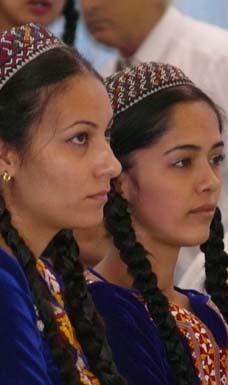
The invitation was (and is) extended to every volunteer who served there - in trips that are scheduled to continue until 2013 - to thank us for our service to South Korea. I journeyed back to my Peace Corps sites - to Daechon on the Yellow Sea and Daejon, a provincial capital - where there were "welcome back" banners above the entrances to the two middle schools in which I taught, speeches and dinners and drinks, with proud old students and even some old fellow teachers, eager to ask me what differences I saw when comparing the South Korea of my youth to the economic powerhouse now. What differences did I see? It was a loaded question, because the differences are as profound as Confucianism, and as ubiquitous as the kimchi everyone eats. The South Korea of my youth had orphans haunting the streets in threadbare hand-me-downs, begging for coins and screaming "Hello, OK!" while the South Korea of today is suited up for modernism like a phalanx of salarymen from its erstwhile enemy and now steady customer, Japan. The South Korea of my youth had hills balded by the axes of the imperialists, while the one of today is forested and beautiful, as if the soil itself has been restored during this past half century, by hard work and a desire to be admired worldwide. The South Korea of my youth was male dominant, while women today are utterly 21st century and so irritated by their troglodyte boyfriends that they often put off marriage into their 40s (making South Korea No. 196 in birth rate). South Korean teachers, these days, are paid well enough that they can afford to go abroad a couple of times a year, while when I was there a teacher's salary was $35 a month. In short, the South Korea of my youth was like a Dickensian English flophouse, war-torn and wasted (as the north still is), while the one my fellow returning volunteers and I visited has every detail of the West's consumerism down, except, perhaps, for self-confidence.
RPCV Richard Wiley wirtes: I recently returned to South Korea at the invitation of its government, on an all-expenses-paid (except for airfare) visit
South Korea's transformation an awe-inspiring wonder
Richard Wiley
Sunday, Oct. 4, 2009 | 2 a.m.
Recently President Barack Obama noted that "… when my father traveled to the United States from Kenya to study, the per capita income of Kenya was higher than South Korea's, (and) now South Korea is industrialized and relatively wealthy while Kenya … is still struggling economically."
It occurred to me when I read that, and again when Bill Clinton brought the two young journalists home from Pyongyang, that whether it's the firing off of one of those unfortunately named taepo dong missiles or Kim Jong Il making a rare public appearance, South Korea seldom catches the interest of the American public, while the failing North Korean regime captures it all the time.
Well, here's a news flash: Far from being simply "industrialized and relatively wealthy," South Korea is now First World.
Back during the time of President Obama's father's study, South Korea wasn't First World, but so distinctly Third World that from 1966 to 1981, the United States sent about 1,900 Peace Corps volunteers to help teach English, battle tuberculosis, and otherwise offer up American youth to aid a situation that could have been avoided after World War II, if everyone hadn't been thinking of Soviet appeasement.
I was one of those Peace Corps volunteers and I recently returned to South Korea at the invitation of its government, on an all-expenses-paid (except for airfare) visit.
The invitation was (and is) extended to every volunteer who served there - in trips that are scheduled to continue until 2013 - to thank us for our service to South Korea. I journeyed back to my Peace Corps sites - to Daechon on the Yellow Sea and Daejon, a provincial capital - where there were "welcome back" banners above the entrances to the two middle schools in which I taught, speeches and dinners and drinks, with proud old students and even some old fellow teachers, eager to ask me what differences I saw when comparing the South Korea of my youth to the economic powerhouse now.
What differences did I see? It was a loaded question, because the differences are as profound as Confucianism, and as ubiquitous as the kimchi everyone eats.
The South Korea of my youth had orphans haunting the streets in threadbare hand-me-downs, begging for coins and screaming "Hello, OK!" while the South Korea of today is suited up for modernism like a phalanx of salarymen from its erstwhile enemy and now steady customer, Japan.
The South Korea of my youth had hills balded by the axes of the imperialists, while the one of today is forested and beautiful, as if the soil itself has been restored during this past half century, by hard work and a desire to be admired worldwide.
The South Korea of my youth was male dominant, while women today are utterly 21st century and so irritated by their troglodyte boyfriends that they often put off marriage into their 40s (making South Korea No. 196 in birth rate).
South Korean teachers, these days, are paid well enough that they can afford to go abroad a couple of times a year, while when I was there a teacher's salary was $35 a month.
In short, the South Korea of my youth was like a Dickensian English flophouse, war-torn and wasted (as the north still is), while the one my fellow returning volunteers and I visited has every detail of the West's consumerism down, except, perhaps, for self-confidence.
During our visit, after toasting ourselves at our old sites, we spent several days in meetings with those who are working to build that missing confidence. The country now has its own "Korea Overseas Volunteers," we discovered, with 1,500 just-out-of-college and very idealistic young men and women heading off to 45 countries, from Bangladesh to Myanmar, to China and even Iraq, imparting the latest trends in information technology or preschool education pedagogies.
South Korea also has a busy "branding" committee, looking for ways not only to increase business (15th-highest GDP), and to salt more palates than those belonging to the few who currently consider South Korea a vacation spot (36th now behind Tunisia and the Czech Republic), but also to somehow separate itself, in the outside world's imagination, from its schizoid and crippled brother, whom everyone seems to want to court.
"Dynamic Korea!" they are considering calling themselves, or "Edible Korea!" since South Korean cuisine is fabulous, and you can't gain weight no matter how much you eat. (South Koreans have a low rate of heart disease, a high rate of stomach cancer.) Or even the wayward but dead-on accurate "Volatile Korea!"
Here, however, is an interesting rub: This South Korea, however hard it might work to pump up its cultural and economic muscles, even with President Obama's recent mild acknowledgement, is always and forever overshadowed by a rotten roof that threatens to cave in on it, by that nuclear-aspiring personality cult up north, firing missiles not only into the Pacific, but into its unknown but almost-certainly terrifying fate, as well.
When I lived there, South Koreans dreamt of reunification, but they don't much like to talk about it now, because the cost would make what happened in Germany look like a cheap buffet lunch. No, most South Koreans think they can continue on as they are, separate but by no means equal, as if the 38th parallel were a vast and impassable ocean, though there's a superhighway leading to it and it's only 30 miles from Seoul.
I hope most South Koreans are right, since my summer visit has rekindled my love of the place.
But what if we had our own schizoid brother? What if someone such as Kim Jong Il ruled Canada? If Americans, too, had a roof that might soon cave in, how would we choose to brand ourselves?
Richard Wiley is a novelist and associate director of the Black Mountain Institute at UNLV.












